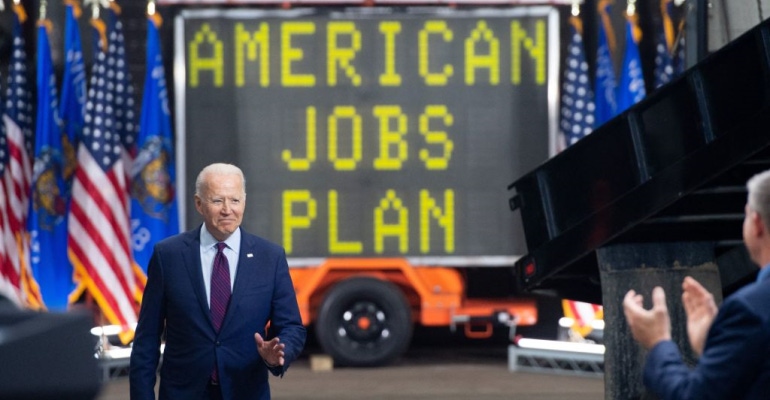
Last week a bipartisan infrastructure deal was struck between President Biden and a bipartisan group of senators—five Democrats and five Republicans. But after reports indicated Biden’s support hinged on Congressional action on the wider encompassing American Families Plan, the deal may face an even tougher uphill climb.
The group announced June 24 they had reached a compromise on a $1.2 trillion framework to fund roads, electric vehicle charging stations, broadband and other "hard" physical infrastructure components. The bipartisan framework also avoids many of the controversial provisions such as harmful tax proposals which had been feared by many in agriculture.
Biden explains that what he and the bipartisan group of senators agreed on is what they could agree on: the physical infrastructure. “There was no agreement on the rest. We’re going to have to do that through the budget process,” says Biden.
Based on the compromise plan, the administration and Democrat leaders in Congress plan to try to pass two bills: the compromise plan and a second focused on Biden’s families plan to be moved forward through the reconciliation process. The American Families Plan contains other provisions of Biden's original $4 trillion proposal, primarily what the administration calls "human" infrastructure, such as child care and elderly programs, as well as ambitious climate measures.
Included in the $1.2 trillion bipartisan infrastructure package is $109 billion for roads, bridges and major projects; $16 billion for ports and waterways; $20 billion for infrastructure financing and $65 billion for broadband infrastructure.
The President has stated he wouldn’t sign the bipartisan deal into law until a bill containing the rest of his agenda also is on his desk, but it is already facing Republican opposition. Democratic leaders hope to advance the bipartisan plan and start the reconciliation process later in July, with the goal of passing both bills by the fall. The new deadline for getting both to Biden’s desk, per Democratic leaders, is Sept. 30.
This reconciliation bill could be upwards of $5 trillion, and many progressives are conditioning their support for the bipartisan package on assurances that a “Phase 2” package also gets sent to President Biden’s desk for signature.
On Monday, Senate Minority Leader Mitch McConnell, R-Ky., warned that Democrats shouldn’t hold the bipartisan bill hostage.
“The President has appropriately delinked a potential bipartisan infrastructure bill from the massive, unrelated tax-and-spend plans that Democrats want to pursue on a partisan basis,” McConnell says.
He called on President Biden to engage with Senate Majority Leader Chuck Schumer and House Speaker Nancy Pelosi and make sure they follow his lead. “Unless Leader Schumer and Speaker Pelosi walk-back their threats that they will refuse to send the president a bipartisan infrastructure bill unless they also separately pass trillions of dollars for unrelated tax hikes, wasteful spending, and Green New Deal socialism, then President Biden’s walk-back of his veto threat would be a hollow gesture.”
As McConnell notes, Republicans have been negotiating in bipartisan good faith to meet the real infrastructure needs of our nation. “The President cannot let congressional Democrats hold a bipartisan bill hostage over a separate and partisan process.”
While touting the infrastructure plan in LaCrosse, Wisconsin, on June 29, Biden says the deal will help high-speed Internet and make sure it's available to every American home, including 35% of rural families who currently go without it.
“And no farmer here in Wisconsin should lose business because they don't have a reliable connection to the Internet -- know when to buy, know when to sell, and know what's going on,” Biden told those in attendance.
He went on to share that back in 1936, the federal government brought electricity to nearly every home and farm in America, and it spread the opportunity out for cities in every part of the country. It changed the lives and fortunes of thousands and thousands of homeowners, thousands of hometowns, and millions of American families. And it set the stage for a massive, sustained economic boom that would follow World War Two.
“High-speed Internet is the equivalent of that today. It's a similar -- it's an equivalent of that. It isn't a luxury; it's now a necessity, like water and electricity. And this deal would provide it for everyone, while bringing down the cost of Internet service across the board,” he says.
The path forward on passing an infrastructure package is anything but smooth, and likely to continue to have bumps and detours along the way.
About the Author(s)
You May Also Like






